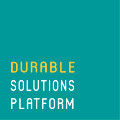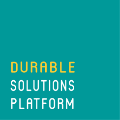A durable solution is achieved when displaced persons no longer have protection and assistance needs related to their displacement and have access to their rights with discrimination (definition of durable solutions adapted from the IASC Framework on Durable Solutions for Internally Displaced Persons, 2010)
(1) voluntary repatriation/return in safety and dignity; (2) local integration in country of first asylum; and (3) third country resettlement. (For more information see generally UNHCR and Solutions. The 2018 Global Compact on Refugees (GCR) speaks about solutions in broader terms including the three tradition durable solutions and “local solutions” and complementary pathways for admission to third countries).
(1) Sustainable reintegration at the place of origin; (2) Sustainable local integration in areas where IDPs take refuge; and (3) Sustainable integration in another part of the country (IASC Framework on Durable Solutions for Internally Displaced Persons, 2010)
Durable solutions are long-term processes with sustainable (re-) integration being the primary goal of all three recognized durable solutions for both refugees and IDPs. Taking this as a starting point and recognizing that durable solutions are currently out of reach for most forcibly displaced in the region, DSP focus on supporting pathways and strengthening prospects for future durable solutions. This means in practice: (1) supporting refugees’ socio-economic inclusion or self-reliance for them to take informed and voluntary decisions if and when solutions become available, and (2) working on supporting a more enabling environment for solutions to become available. This means maintaining a dual focus on immediate needs while maintaining momentum and addressing structural displacement vulnerabilities through medium-term (3 – 5 years) planning and approaches.
DSP is not an implementing agency but a joint initiative of currently six NGO members: AAH, DRC, IRC, Oxfam, NRC, and Save the Children. DSP seeks to support a collective agenda on durable solutions through joint research and cross-learning opportunities, evidence-based policy engagement and capacity strengthening on durable solutions concepts, approaches, and programming amongst members and partners.
The durable solutions context across the Middle East therefore requires sustained commitment and collective action from diverse actors that links humanitarian, development, and peacebuilding responses. Progress towards and ultimately accessing a durable solution will inevitably be a long-term and complex process that can only be achieved through a multi-stakeholder approach to influencing necessary policy changes and providing appropriate support to people seeking to end their displacement.
DSP promotes and holds itself accountable to support locally led approaches. This includes working with and supporting civil society organizations (CSOs) to and supporting local ownership through engaging CSOs in DSP led research, dissemination and capacity strengthening approaches including provision of partnership sub-grants. In the last few years DSP has developed a network of Syrian organizations across the region – the Voices for Displaced Syrian Forum (VDSF) – and has invested in strengthening their capacities on solutions frameworks and advocacy. VDSF was established in November 2019 and with DSP support is now an independent entity. DSP has also increasingly sought connections between Syrian civil society and civil societies of refugee-hosting countries as well as national partners including our current work with the Jordan River Foundation (JRF) in research and advocacy on youth education and self-reliance in Jordan. Building a strong regional civil society network on durable solutions advocacy is also part of DSP’s exit strategy as local actors will more likely be at capacity to be handed over DSP work streams.

